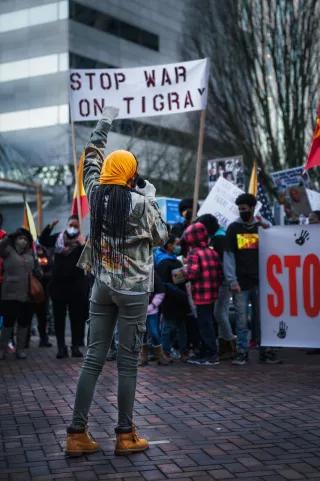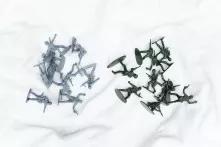Since 2020 a war has been ongoing in the Tigray region of northern Ethiopia. The conflict quickly spread to the neighboring regions of Amhara and Afar, leading to a humanitarian crisis. Since the conflict began, the region has been almost entirely cut off, with no telecommunications, no internet, and no basic commodities. The population has been left to its own devices, numerous human rights violations occur on a daily basis. Sexual violence is being employed deliberately and systematically as an instrument of war by all parties to the conflict in northern Ethiopia.

Armed conflict has been ongoing in the Tigray region of northern Ethiopia since November 2020, leading to a humanitarian crisis of daunting proportions. The conflict quickly spread to the neighbouring regions of Amhara and Afar. As many as half a million people are estimated to have died since the outbreak of hostilities,[1] and more than 2.5 million people have been displaced.[2] The infrastructure in Tigray has been largely destroyed. Millions of people are desperately in need of food aid. However, the region has been almost entirely cut off since the conflict began, with no telecommunications, no internet, and no basic commodities. Nothing and nobody is allowed to enter the region without special authorisation, and barely anyone is able to obtain such authorisation. The population in Tigray has therefore been left to its own devices, and the international community is turning a blind eye to the numerous human rights violations.
Sexual violence is being employed deliberately and systematically as an instrument of war by all parties to the conflict in northern Ethiopia.[3] Amhara, Ethiopian and Eritrean armed forces are using rape and other forms of sexual violence against Tigrayan women and girls in order to destroy Tigrayan communities and quell resistance. People are being put under tremendous pressure to submit or leave in order to give the perpetrators control over territories. Conversely, Tigrayan armed forces are committing similar crimes against Amhara women and girls.[4] On both sides, these deeds often take the forms of acts of revenge and are accompanied by ethnic slurs, escalating the hatred and violence still further.
The term “sexual violence” describes any deliberate act that violates an individual’s right to sexual self-determination.[5] Such acts take various forms. In Tigray, women and girls – including children and pregnant people – are being raped by single assailants or groups. This sometimes takes place before the eyes of the victim’s own children or other family members. One woman who was gang raped in western Tigray in November 2020 told Amnesty International: “They raped me one after the other… I don’t know if they realised I was pregnant. I don’t know if they realised I was a person.”[6]
The goal of the perpetrators is to cause their victims maximum pain and harm, which is why the rape is often accompanied by additional forms of abuse.[7] Alongside torture, arbitrary arrest and plundering, sexual violence is a means to terrorise and humiliate the civilian population.[8] Survivors report being beaten, threatened with death, and sometimes mutilated with objects such as hot metal rods or nails.[9] Some women have been raped when fleeing to Sudan and have even been kept imprisoned for days or weeks in conditions of sexual slavery.[10]
The use of sexual violence by all parties to the conflict makes them guilty of war crimes. War crimes are serious violations of humanitarian law that are committed during an armed conflict and targeted against the civilian population. Article 8 of the Rome Statute of the International Criminal Court defines rape, sexual slavery, enforced prostitution and forced pregnancy as acts amounting to war crimes.[11]
The only conclusion to be drawn from the extent of the violence in Tigray – its widespread use and its brutality – is that the Ethiopian government must be aware of the targeted use of sexual violence by the armed forces that it sponsors and supports. There are no known measures or efforts to counteract these incidents, which are systematic in their entirety. Amnesty International and Human Rights Watch have substantiated evidence that sexual violence and other human rights abuses are being intentionally and systematically employed against the Tigrayan population in the western Tigray region, coordinated and implemented by the Amhara authorities and armed forces. This deliberate campaign against the Tigrayan civilian population constitutes a crime against humanity.[12] Article 7 of the Rome Statute lists “rape, sexual slavery, enforced prostitution, forced pregnancy, enforced sterilization, or any other form of sexual violence of comparable gravity” as a crime against humanity “when committed as part of a widespread or systematic attack directed against any civilian population, with knowledge of the attack”.[13]
The ceasefire declared in March this year came to an end in August, when fighting resumed and all hopes of bringing humanitarian aid to Tigray were dashed. There are currently no prospects for peace or a lasting resolution to the conflict. It is therefore all the more important that the international community direct its attention to northern Ethiopia and commit to de-escalating the conflict there. Initially, many countries viewed developments in Tigray with shock and concern, but in the wake of Russia’s attack on Ukraine, all eyes have turned away from Ethiopia. Despite the severity of the hostilities and the massive human rights abuses, the UN Security Council has never yet discussed the Tigray conflict at its sessions. The African Union and the international community must exert pressure on the Ethiopian government to open up the region and ensure that humanitarian aid can finally reach the people of Tigray. So far, the dire situation of the women and girls there has played no role in the political agenda. Pressure from the international community is the only way to get all the parties to the conflict to embark on peace negotiations. Those individuals who have committed sexual violence and other human rights abuses during the conflict must be removed from northern Ethiopia and brought to justice. This is a prerequisite for lasting peace. The international community can play a positive role by supporting projects that help the victims of sexual violence, instead of continuing to turn a blind eye to them.
I would like to thank Ava Schuster for her help in preparing the information for this article.
* The content and opinions expressed in the article are those of the author and do not necessarily reflect the views of the Heinrich Böll Foundation
[1] Ghent University: http://geoweb.ugent.be/projects/614af09dd397c8051012ae9a (accessed on am 29 September 2022).
[2] United Nations High Commissioner for Refugees: https://www.unrefugees.org/news/ethiopia-s-tigray-refugee-crisis-explained/ (accessed on 29 September 2022).
[3] Amnesty International: “‘I don’t know if they realized I was a person’: Rape and sexual violence in the conflict in Tigray, Ethiopia”; 2021: https://www.amnesty.org/en/documents/afr25/4569/2021/en/; p. 5 et seqq.
[4] Amnesty International: “Ethiopia: Summary killings, rape and looting by Tigrayan forces in Amhara”; 2022: https://www.amnesty.de/sites/default/files/2022-02/Amnesty-Bericht-Aethiopien-Amhara-TPLF-Kaempfer-Gewalt-gegen-Zivilbevoelkerung-Februar-2022.pdf; p. 14 et seqq.
[5] ZARTbitter Beratungsstelle gegen sexualisierte Gewalt: https://www.zartbitter-muenster.de/informationen/sexualisierte-gewalt/begriffsdefinition; (accessed on 29 September 2022).
[6] Amnesty International: “‘I don’t know if they realized I was a person’: Rape and sexual violence in the conflict in Tigray, Ethiopia”; 2021: https://www.amnesty.org/en/documents/afr25/4569/2021/en/; p. 13
[7] Amnesty International: “‘I don’t know if they realized I was a person’: Rape and sexual violence in the conflict in Tigray, Ethiopia”; 2021: https://www.amnesty.org/en/documents/afr25/4569/2021/en/; p. 17 et seq.
[8] Amnesty International, Human Rights Watch: “‘We will erase you from this land’: Crimes against humanity and ethnic cleansing in Ethiopia’s Western Tigray Zone”; 2022: https://www.amnesty.org/en/documents/afr25/5444/2022/en/
[9] Amnesty International: “‘I don’t know if they realized I was a person’: Rape and sexual violence in the conflict in Tigray, Ethiopia”; 2021: https://www.amnesty.org/en/documents/afr25/4569/2021/en/; p. 16 et seq.
[10] Amnesty International: “‘I don’t know if they realized I was a person’: Rape and sexual violence in the conflict in Tigray, Ethiopia”; 2021: https://www.amnesty.org/en/documents/afr25/4569/2021/en/; p. 14 et seqq.
[11] Rome Statute of the International Criminal Court (ICC), Article 8, War crimes; (1998): https://www.ohchr.org/en/instruments-mechanisms/instruments/rome-statute-international-criminal-court
[12] Amnesty International, Human Rights Watch: “‘We will erase you from this land’: Crimes against humanity and ethnic cleansing in Ethiopia’s Western Tigray Zone”; 2022: https://www.amnesty.org/en/documents/afr25/5444/2022/en/; p. 125 et seqq.
[13] Rome Statute of the International Criminal Court (ICC), Article 7, Crimes against humanity, (1998): https://www.ohchr.org/en/instruments-mechanisms/instruments/rome-statute-international-criminal-court

